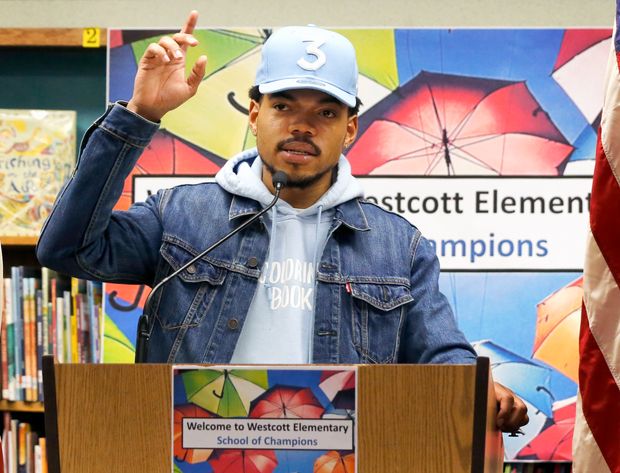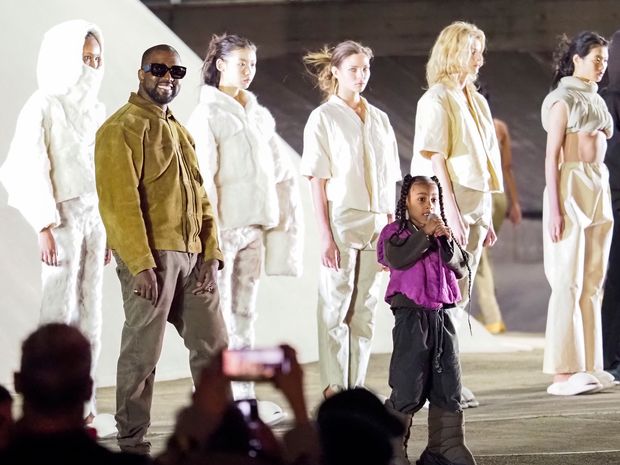From Rihanna to Kanye West: Why Music’s Biggest Stars Aren’t Focused on Actual Music – The Wall Street Journal
From Rihanna to Kanye West: Why Music’s Biggest Stars Aren’t Focused on Actual Music The Wall Street Journal

One of music’s biggest stars has a major “drop” coming this month.
There have been teases in the media, an official July 14 announcement on Instagram viewed 4 million times and Twitter messages to hungry fans. “The wait [is] soon done,” the star told one. “I got you!”
But it’s not a blockbuster album that’s prompting this promotional blitz. It’s a skin-care line. The star? Rihanna.
Although she has said her ninth album—the follow-up to 2016’s “Anti”—is in the works, nobody knows when it actually is coming. She hasn’t released an album or solo single in four-and-a-half years.
Such prioritizing is the new normal for music’s top artists, who seem more focused on fashion collabs, music-competition shows and alcohol labels than making music. This week, Kanye West announced an album but caused a bigger storm when he unveiled a deal with Gap and said he would run for president. (He also stirred controversy with remarks at a rally in South Carolina and on Twitter.) Justin Bieber’s latest album, released in February, was his first in more than four years. Chance the Rapper’s fans waited over three years for his latest project as he supported Chicago public schools and bought local news site Chicagoist. Stars at all levels are getting in on it—and earlier in their careers: Harlem rapper A$AP Ferg has partnered with Tiffany & Co. While Post Malone released an album in September, the rapper and singer, 25, already sells rosé.
Creating new albums is less important than leveraging fame to launch businesses that can boost profits, feed fans eager for news and extend celebrity beyond the shrinking shelf-life of music careers. This is a sign of how the economics of the industry have changed (streaming isn’t lucrative in the way that CDs once were, and there’s no longer stigma associated with “selling out”). It also indicates how music as a stand-alone art form has lost clout as a cultural force and become more of a promotional tool.

Chance the Rapper took his time with his latest music project, focusing instead on Chicago public schools and other efforts. Above, the rapper announced a $1 million gift to the Chicago Public Schools Foundation in 2017.
Photo: Charles Rex Arbogast/Associated Press
Roughly 20% to 50% of the typical superstar’s income now comes from revenue unrelated to music activities, music-industry executives say. When A-list acts aren’t touring, things like cosmetics lines, American Idol judgeships and sponsored Instagram posts can account for the lion’s share—80% or more—of income. That’s up dramatically from a decade ago when such side hustles usually didn’t exceed 10% or 20% of income and were negligible for most artists, insiders say.
“It’s exploded in the last 10 years,” says Mitch Rose, co-head of contemporary music at talent agency CAA, which represents Beyoncé and Bruce Springsteen. “Artists, without being cliché, have become brands.”
Putting out a so-so album can pose a risk to all that. Take Justin Bieber, for example. Compared with 2015’s “Purpose,” Mr. Bieber’s “Changes,” in February, was met with a lukewarm response. In an unusual move, in early March he downgraded eight planned stadium dates to smaller arenas—before eventually scrapping the tour because of Covid-19. The initial move was widely seen as due to slow ticket sales.
The drop in demand for Mr. Bieber after a long wait is a cautionary tale, says John Kellogg, a music-business expert and director of the Master of Arts in Music Business Degree program for Berklee Online. “He couldn’t sell tickets,” Mr. Kellogg says. “I think it really hit him.”
Stars may underestimate the risk of not producing enough major projects, Mr. Kellogg says. “If you don’t serve these fans, they’re not going to serve you,” he says. Today, “fans can move on very quickly.”
A representative for Mr. Bieber declined to comment.
Related Video
Instead of releasing an album every two or three years, some superstars seem to be taking four or more. Rihanna, for example, put out one album a year between 2005 and 2012—the only exception was 2008.
“We’re not seeing that same pace from superstar artists,” says Dan Runcie, founder of Trapital, which covers the business of hip-hop. “Because there are other ways to make money that don’t necessarily have the same level of effort put in, music really has to come from, A, someone who’s trying to get their name out there or, B, somebody who already made it and loves the craft.”
Of course, some superstars may have passed their creative peaks or have health issues. Launching non-music businesses also helps superstars diversify their income away from touring. And in today’s obsessive, social-media-driven fan culture, some may see their idols one-dimensionally, refusing to let them develop interests outside music, experts say.
But the reduced focus on music—less frequent albums, more “stopgap” or minor projects, even just less attentiveness to the creative process—can be bad for music fans and artists alike.
Mr. West has released several mini-albums and religious-themed projects since his last full-length album, 2016’s “The Life of Pablo.” Late Monday night, he said his latest album would arrive on Friday.
The announcement came as Mr. West’s statements this week at a rally in South Carolina and on Twitter generated headlines. On Wednesday, Mr. West’s wife, Kim Kardashian West, said he has been struggling with bipolar disorder. A representative for Mr. West declined to comment.
But for a while now, some critics have said Mr. West’s recent material has seemed slapdash compared with his earlier work. As Mr. West has become more of a businessman, “his musical output, the quality of it, has weakened,” says Brian Zisook, editor in chief of hip-hop website DJBooth and vice president of content operations and artist services for the streaming service Audiomack.

Kanye West and daughter North West on the runway for the Yeezy fashion show during Paris Fashion Week in March.
Photo: Arnold Jerocki/GC Images/Getty Images
In the case of Rihanna, not releasing new music alienates some fans and—by averting risks—can impede her growth as a music artist.
Her anxiously awaited follow-up to the critically-acclaimed “Anti” has become a running joke among fans. Whenever the 32-year-old R&B- and dance-pop singer takes to social media to promote her fashion lines, some fans prod her for new music, posting jabs like “DO U NEED A RIDE TO THE STUDIO?”
Rihanna has responded by toying with them. She has joked online about feeling “attacked” and sold T-shirts that read “No More Music.” In December, she posted that she was listening to the album but refusing to release it. In May, she joked about misplacing it.
SHARE YOUR THOUGHTS
What do you think is lost or gained when music stars extend their reach across the culture and not just in music? Join the conversation below.
A representative for Rihanna said the artist and her management were unavailable for interviews.
Since “Anti,” Rihanna has expanded her fashion empire: There is Fenty Beauty, a makeup line; Savage X Fenty, her lingerie label; and more recently, Fenty, a fashion house, part of a historic collaboration with luxury-goods giant LVMH. On July 31, Rihanna will open Fenty Skin, a skin-care line.
Forbes magazine estimates most of Rihanna’s reportedly $600 million fortune comes not from music, but fashion. “From that perspective, where’s the motivation?” says Mr. Zisook. “I wouldn’t want to put more time and attention into something that at this stage of my career wasn’t my primary moneymaker. It’s just bad business.”
Some fans feel differently.
Jason Kassover, 29, who has followed Rihanna since 2005 and lives near Orlando, Fla., applauds Rihanna’s business acumen, but says she needs to release her album this year. “As a man, I don’t buy lingerie and makeup—so it gets kind of annoying after a while,” Mr. Kassover says. Music “has kind of been an afterthought.”
While Covid-19 has delayed several blockbuster albums, Rihanna could still surprise fans. Even a single or two would help placate them, says Mr. Kassover. “Just give us something.”
Write to Neil Shah at neil.shah@wsj.com
Copyright ©2020 Dow Jones & Company, Inc. All Rights Reserved. 87990cbe856818d5eddac44c7b1cdeb8